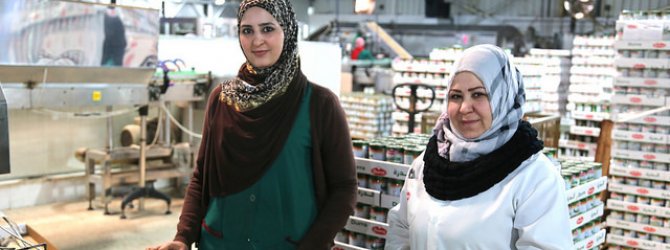-
What’s Inspiring WANA: Al-Durra Food Factory
What’s Inspiring WANA: Al-Durra Food Factory

Interviews are perhaps one of the most engaging ways to do research. For one of our upcoming research projects (stay tuned), we were on the lookout for Syrian investors who have chosen Jordan as a safe haven for their industrial operations. Al-Durra, a food manufacturing ‘giant’, was recommended by a number of our research partners as a pioneering Syrian investor in Jordan and perhaps the largest Syrian company to have made the choice to relocate. There was a lot to find out about their rationale for relocating their operations to Jordan, so we felt compelled to make the trip to Irbid to visit them at their headquarters. As it turned out, their relocation has resulted in a proper win-win situation.
Located in Irbid’s Al-Hassan Industrial Estate since 2011, the Al-Durra factory is situated among tens of other factories, providing a working model of an industrial cluster. In addition to the impressive setting for its operations, Al-Durra’s achievements over the past four years stood out as particularly striking. As soon as we arrived we were guided to their meeting room which shelved a myriad of Middle Eastern food products. What is remarkable about these products – besides the beautifully designed packaging – is that the majority of them are intended for exports, which means that Al-Durra is contributing positively to Jordan’s trade balance.
We were soon joined by the Director General of the factory, Mr. Mohammad Khair al-Nan. What was meant to be a half hour interview for the purposes of our research expanded into a two hour conversation into the potential role of uprooted Syrian businesses can play in aiding Jordan’s economic development process – and a strong case was made by Mr. Al-Nan.
The company is today the only food factory in the Kingdom who meets Europe’s stringent quality control standards. Consequently, it is increasing Jordan’s export capacity, its products being sold in Europe with a ‘Made in Jordan’ label on them. Furthermore, thanks to the company, for the first time ever, Jordan has become an exporter of a Ramadan delicacy called amardeen, a staple that traditionally has been imported to Jordan and sold in domestic markets at more expensive rates.
Al-Durra started out as a factory of 500 workers, the majority of which were Syrian in 2011. Interestingly, when relocating, the factory was also able to bring over their most valued experts over from their Syrian headquarters. Moreover, during the tour of the factory grounds, we noticed a significant number of Jordanian students being trained through agreements signed by Al-Durra and neighboring Jordanian universities. Al-Durra is today abiding by Jordanian labour quotas for the industrial sector with around 400 of its workers being Jordanian. Achieving such a high rate of Jordanian employment was only possible because of the knowledge transfer the factory has facilitated so far.
Besides relying primarily on Jordanian labour, another impressive dimension is that most of the factory workers were women – both in low-skilled and high-skilled positions. Valuing female expertise became evident when we met a number of experts who were formally relocated from Syria, under the justification that their expertise was unmatched on the Jordanian labour market. Three out of five of these experts were women who have worked for at least 15 years in the factory in a high-skilled capacity. Given that Jordan’s female labour participation rate stands at a dismal 14 percent, Al-Durra’s employment pool is a testament to reconciling female labour force participation with Jordan’s development goals, particularly ones that pertain to the industrial sector.
The way forward for Jordan lies in creating value-added economic activity, such as developing the industrial sector, enhancing labour force participation for both Jordanian men and women, and balancing this with job formalization and creation for Syrian residing in the Kingdom. The experience of Al-Durra shows that this is not a mutually exclusive process. These goals are complementary and achievable if Jordan manages to attract foreign investments. Al-Durra Factory is a working example of how these three goals can be achieved under one roof, and can in fact complement and enhance each another.

